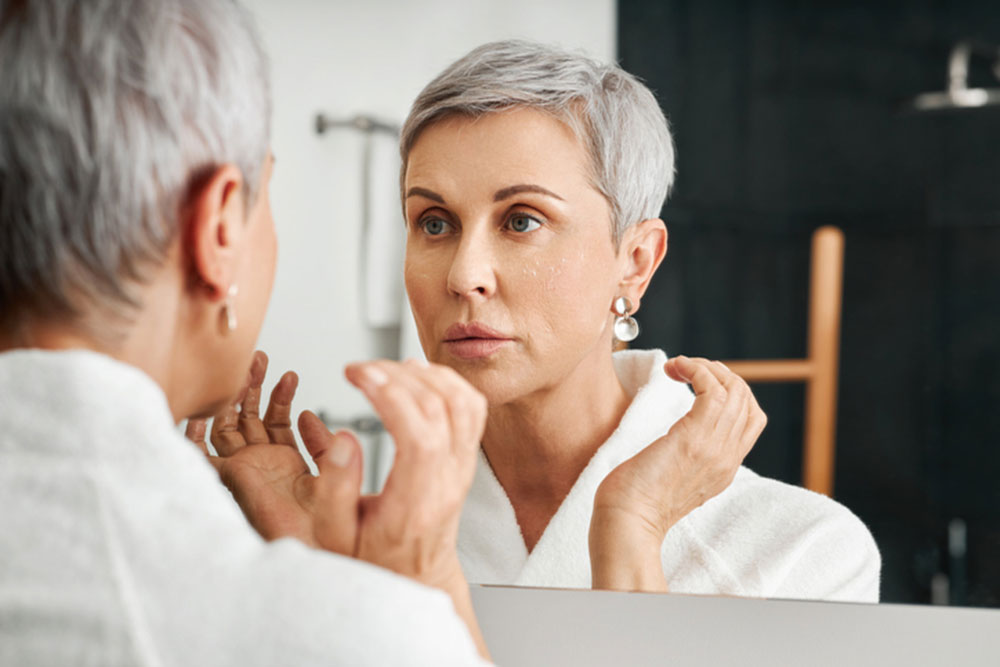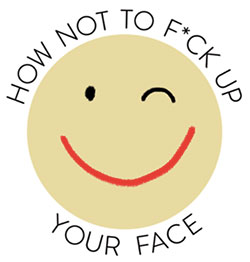
There she is! Judging, judging . . . / iStock photo.
By Valerie Monroe
A WHILE BACK, longtime advice columnist and Sorceress-in-Chief E. Jean Carroll posted a reader question on her addictive Substack that went like this:

Can’t get enough Valerie Monroe? There’s more at https://valeriemonroe.substack.com.
Dear E. Jean:
I was trying on clothes tonight, figuring out what to wear for a job interview. At first, when I inspected myself in the mirror, I thought I was pretty, slim, and attractive. But then I viewed myself from a new angle and realized I looked like hell. This quasi-empirical observation has led me to the conclusion that I’m probably a mess more often than I think. What I wonder is: When I look in a mirror and like what I see, how do I know I don’t really look like shit? —Hope I’m Not Tailgating Myself
Then, with great generosity, because she knows I write about self-criticism related to appearance, Auntie E. suggested her flocks (and flocks) of readers have a look at a few of my posts. What followed? All day long—and all night, too—E. Jean’s loyal readers trotted over here to look at the scenery. Thank you, dear E.! Thank you, dear E.’s readers! I hope you find some interest and solace at HNTFUYF. As for my own loyal readers, you are generally a quiet bunch, but I can see you are reading and for that, I love you.
The robust response to E. Jean’s reader question brought me back to a story I wrote for O, The Oprah Magazine (below), in which we asked readers to pledge to be kinder to themselves and other women concerning appearance. Not many of our millions of readers took that pledge, but I don’t think that’s important today. What is important: That we learn to look at ourselves with the same loving awareness with which we look at the people we love.
Everywhere we turn, there are images of gorgeous women, constant reproaches to the reality of us, with our real bodies and un-Photoshopped flaws. We’re not buying it anymore. We’re tackling the critics—from the parents and teachers who favor the prettiest children to look-ist employers to the most hurtful of all, that nasty, catty girl who lives right behind our eyes.
Not long ago, I sat in my office, chatting with a friend. “I want to talk to you about your face,” I said. “Oh my God,” she said, looking stricken. “Do I need a facelift?” (I forget that people think I have a right to be openly critical of their appearance because I’m a beauty editor.) No, no, I said; I only wanted to know what she saw when she looked in the mirror.
“I like my face now,” said this woman, a classically beautiful 38-year-old, very polished and buttoned-up, as neat and perfectly composed as a Modigliani painting. “But I was adopted from Korea when I was 3, and I grew up in a predominantly white community in a small Midwestern city, where there weren’t many other people who looked like me. I was teased, called names; I basically spent my entire childhood being made fun of because of my face.” She said this calmly and, recollecting, was silent for a moment. I waited for her to go on. But when she tried to speak again, she burst into tears. And there she sat in the chair across from my desk, crying hard for several minutes. I offered her a handful of tissues while she apologized for breaking down. This woman is so self-controlled, I’ve never even seen her yawn. Finally, she said, “I didn’t realize how fragile I still am about this.”
“I wanted to do anything I could not to look Asian, because it set me apart,” said my friend. “You know, I had some really bad perms. But when I got to college, where there were a mix of ethnicities, the stigma of my face just disappeared. There were people who appreciated my beauty, and so I began to see myself the way they did.” In other words, she made the liberating discovery that there was nothing wrong with her face, and something wrong with the culture of her hometown.
Even when we understand that liberating discovery, we may continue trying to “pass,” minimizing with cosmetics (or, in the extreme, surgery) what deviates from the cultural ideal, playing up what conforms, says Rita Freedman, PhD, a clinical psychologist and author of the book Beauty Bound. “It’s what you project onto the reflection in the mirror that determines how you evaluate it,” she says.
I spoke to several other women I had assumed—because they are all accomplished and beautiful—felt fine about their face. One, thinking of a photograph of herself as a 13-year-old, teared up as she remembered the depth of her self-revulsion. (This time I was ready with the tissues.) Another tried determinedly to convince me that she was a truly ugly person till her 20s, at which point, she said, she was briefly attractive before becoming merely plain in her 30s. A third told me she couldn’t wait to get glasses so that she could hide the gigantic bump on her nose (a gigantic bump that was invisible to me). And a fourth—stunning, without a stitch of makeup—said that she knew she wasn’t horribly disfigured, but avoided looking at her face in the mirror whenever possible (as if she were . . . horribly disfigured).
Though the cultural ideal has broadened to include more diversity, it remains an ideal, setting an unrealistic standard by which we all, consciously or not, judge and are judged. The painful truth is that physically attractive people get rewarded in all kinds of ways: As children they’re usually disciplined less harshly and favored in the classroom; as adults they tend to have better-paying jobs in higher-level positions than their less attractive counterparts, writes Gordon L. Patzer, PhD, in his book, Looks: Why They Matter More Than You Ever Imagined. Which, frankly, stinks.
It stinks even if you’re gorgeous, by cultural standards. Valuable as it is, gorgeous is not a good stock to invest in. It has a completely predictable payout. No matter what you do, how well you take care of yourself, how much surgery you submit to, one day you are going to lose everything on your investment. You know this, I know this. Even so, we buy into the beauty rules, colluding with a culture that makes us feel inadequate, whipping ourselves when we come up short. Which makes us—come to think of it—part of the problem.
What if, instead of colluding, we traded cruelty for kindness? What if we started a revolution, if each one of us took a vow to catch ourselves scowling or sneering at our imperfections—and simply stop? If we noticed every time we had a nasty, hostile response to someone else’s appearance—and simply stopped? Think about who your inner critic is: She’s the mean girl who doesn’t want you in her club, the one who takes pleasure in pointing out all the ways you don’t measure up. Her trump card is your fear, fear that you will never measure up, that you are, bottom line, unlovable. Every moment you spend calculating your imperfections (or anyone else’s), you are taking her side.
This is a call to arms. A call to be gentle, to be forgiving, to be generous with yourself. The next time you look into the mirror, try to let go of the story line that says you’re too fat or too sallow, too ashy or too old, your eyes are too small or your nose too big; just look into the mirror and see your face. When the criticism drops away, what you will see then is just you, without judgment, and that is the first step toward transforming your experience of the world.
If you think this is a valuable, even critical message, please share this post with someone who might benefit from reading it. Let’s make kindness—today, right here, right now—our first beauty commandment.
If you’re interested in feeling happier about your appearance—especially as you age—you might like reading what she has to say about it. For more of her philosophical and practical advice, subscribe for free to How Not to F*ck Up Your Face at valeriemonroe.substack.com.

OMG! YES!! Wonderfully written column. I think though, that it takes a certain level of maturity to get to not just acceptance, but the level of self love necessary to realize we are all beautiful.